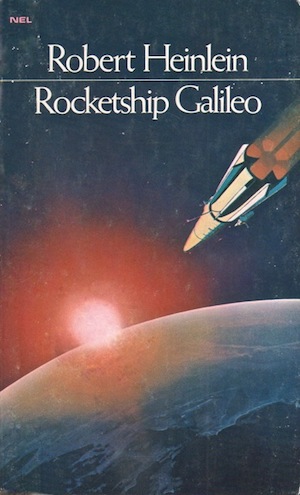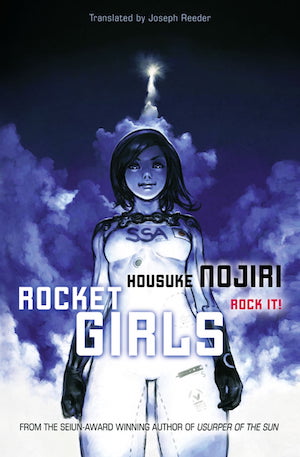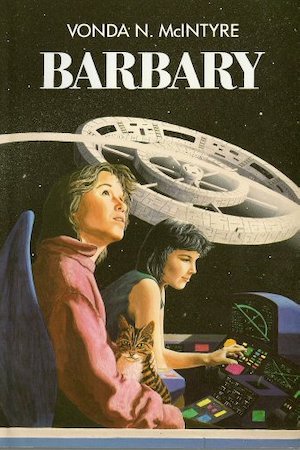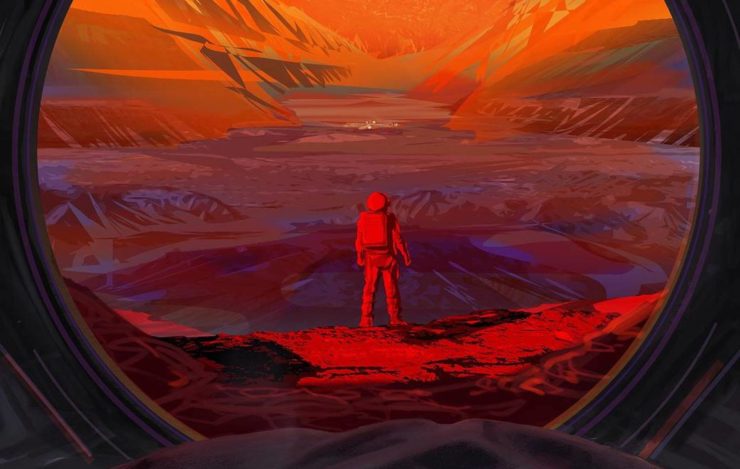Why send teens into space? They are the ideal astronaut candidates: They are less likely to grasp the inherent risks involved in space travel, so might be less terrified to know they are about to be launched into space by a rocket built by the lowest bidder. Also, if things don’t turn out well, losing a fifteen-year-old in the vast emptiness of space is arguably less costly than losing a seasoned, experienced adult.
…or so the authorities in some SF settings would argue.
In our real world, space efforts are kneecapped by namby-pamby nanny-state-isms like safety and basic human decency. Not so science fiction creators, who have gleefully jumped on the story potential of TEENS…IN…SPACE.
Consider these five works about space-going teens.
Rocket Ship Galileo by Robert A. Heinlein (1949)

Rocket fans Ross Jenkins, Art Mueller, and Maurice Abrams’ space travel ambitions seem doomed by their discovery of a supine body near their model rocket launch facility. Happily, Art’s uncle Don Cargraves is unconscious, not dead, and his condition is no fault of the teens. Rather than ending the teens’ rocket careers, Don recruits them to assist in building a real atomic rocket. As one does.
Despite various misadventures, some more suspicious than others, the team is successful. Since there’s no point in building a rocket one does not plan to use, the rocket ship Galileo sets off for the Moon with the quartet on board. There is one small problem: the saboteurs who plagued the project are waiting for the Americans on the Moon. Galileo may reach Earth’s satellite; it will not be returning.
Blast Off at Woomera by Hugh Walters (1957)

The discovery of domes on the Moon can mean only one thing. The lunar domes are clearly artificial; aliens are very unlikely; some terrestrial nation must have constructed the domes. Perhaps it was communists! It’s up to the Anglo-Australian space program to determine who built the domes and for what purpose.
There is one tiny hitch, which is that the largest rocket on hand is too small to accommodate an adult male. Fortuitously, Chris Godfrey is bright, enthusiastic about rockets, and only four foot eleven inches tall. He’s an ideal candidate for the job. Too bad the security measures intended to protect Godfrey instead make him a target for a determined Red saboteur.
Should Godfrey survive the launch and the subsequent trip to the Moon, he will receive a personal lesson in the fact that “very unlikely” is in no way equal to “impossible.”
Rocket Girls by Housuke Nojiri (1995, English translation 2010 by Joseph Reeder)

Unlike Blast Off at Woomera’s Anglo-Australian space program, the privately funded Solomon Space Center possesses rockets large enough to accommodate a full-sized adult male, at least for as long as it takes the LS-7s to explode in mid-air. The LS-5 rockets are far more reliable. However, LS-5 payloads are much smaller than LS-7. No worries! The SSC has a plan. It involves a radical surgical procedure that will reduce the mass of the remaining astronaut. The astronaut flees.
The SSC then decides to enlist Japanese schoolgirl Yukari Morita. The petite student is ideal. Not only is she small enough to fit into an LS-5 without any amputations, she can be manipulated. She is in the Solomon Islands searching for her long-vanished father. The SSC promises to find her father if she will agree to be the SSC’s first teen astronaut.
It just so happens that the SSC already knows where her dad is. No problem finding him. The problem will be sending her into space and retrieving her alive.
Barbary by Vonda N. McIntyre (1986)

Unlike the previous protagonists, the adults in charge of twelve-year-old Barbary have no intention of using her as a bite-sized experimental subject. She is an orphan; she has a foster father—he’s on research space station Einstein, and she’s being sent to live with him. It’s a fine plan but one that does not take into account Barbary’s adventurous impulses.
Such as smuggling her cat onto the space station. This might be an unexpected burden on the station’s closed-loop life-support system. Bad Barbary! But it all turns out fine when the cat proves to be the means to limiting the station’s unwanted rat population.
Later Barbary manages to entangle herself in a First Contact situation, the outcome of which will have consequences for all humanity.
Voices of a Distant Star, directed by Makoto Shinkai (2002)
School girl-turned-mecha pilot Mikako Nagamine accompanies the rest of her squadron on the spacecraft carrier Lysithea as the Lysithea pursues humanity’s Tarsian enemies into deepest space. Mikako’s friend Noboru Terao remains on Earth. Determined to remain in contact with Noboru, Mikako sends him message after message.
The catch? Lysithea is able to make one-way superluminal jumps but its communications with Earth are strictly light-speed. Thus, with each step of her journey towards the alien world Agartha and the battles that await there, the time lag becomes greater. Noboru will indeed get his messages… eight years too late for them to matter.
***
Imperiling fictional teens is a proven, popular way to attract teen readers. I am sure that my readers may be able to think of dozens of books or stories I inexplicably overlooked. Comments are, as ever, below.
In the words of fanfiction author Musty181, prolific book reviewer and perennial Darwin Award nominee James Davis Nicoll “looks like a default mii with glasses.” His work has appeared in Publishers Weekly and Romantic Times as well as on his own websites, James Nicoll Reviews (where he is assisted by editor Karen Lofstrom and web person Adrienne L. Travis) and the 2021 and 2022 Aurora Award finalist Young People Read Old SFF (where he is assisted by web person Adrienne L. Travis). He is a four-time finalist for the Best Fan Writer Hugo Award, and is surprisingly flammable.










